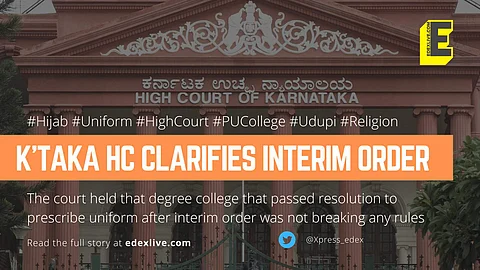

The full judge Bench of the Karnataka High Court on Wednesday, February 23, issued a clarification on its interim order that prohibits students from wearing any items of religious clothing in educational institutions where a uniform has been prescribed. A petition was filed by Advocate Mohammed Tahir on behalf of students of the Bhandarkar Degree College in Udupi, which was allegedly barring Muslims students in hijabs from entering the college.
The petitioners claimed that the court, in the interim order, said that in colleges where the College Development Committees (CDC) have prescribed a uniform, students are required to follow it and must not wear any additional items of religious clothing. However, the judge said that the CDC was mentioned in the case of the PU College in Udupi and that the order applies to all schools and colleges, whether degree or undergraduate or PU Colleges, that have a uniform prescribed.
However, Tahir argued that the college applied to prescribe a uniform after the controversy around hijabs began. Advocate General Prabhuling Navadgi submitted that the college in question had appeared before a single bench of the court and stated that they have passed the resolution to prescribe uniforms. "If the college has violated any orders, then they should bring that into question," he added.
The Chief Justice of the Karnataka High Court, Ritu Raj Awasthi, reiterated that the order applies to all institutions with a uniform and refused to admit Adv Tahir's submission that this could cause "chaos in the society". Additionally, the court was informed that institutions were asking teachers to remove their hijab before entering colleges and schools because of the interim order. To this, the Chief Justice clarified that the order only applies to students.
The court will continue hearing the matter tomorrow, February 24, at 2:30 pm. The court had asserted yesterday that they wish to conclude the case by Friday, February 25. Today, the court heard submissions from Advocates S Naganand and Sajjan Poovayya who responded on behalf of the teachers and the CDC of the PU College in Udupi in question, respectively.
Adv Sajjan Poovayya, who represented the college, submitted, "It is the duty of a school to ensure that a minor girl is not shackled to a practice. They should be given the chance to decide whether they want to wear the hijab or not when they turn adults. The school is required to ensure that secularism is achieved," adding that the petitioners did not insist on wearing the hijab until December. He also reiterated AG Prabhuling's stand on how if the hijab rule is given religious sanction, those students who choose not to wear it will be termed "irreligious". He also asked why girls should be asked to dress modestly and not boys. "It is my responsibility as a school to ensure this is not allowed," he added.
Earlier, Adv Naganand had accused the Campus Front of India of instigating the protests and inciting the students into demanding the right to wear hijabs in institutions. The CFI was described as a radical institution by the Advocate and a report was sought on the organisation by the court.
